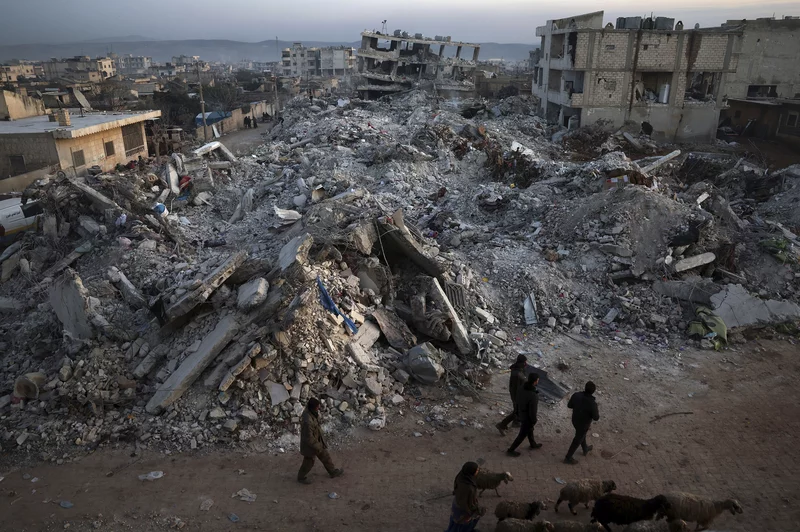Not enough aid reaches Syria in the aftermath of devastating earthquake
Collapsed buildings in the town of Jinderis, Syria
On February 6th, 2023, a magnitude 7.8 earthquake struck southern Turkey and northwestern Syria. This seismic event has marked the deadliest earthquake to hit the region in over a century. The Arabian Peninsula was due for a big earthquake but no one knew the devastation that would follow. Over a week after the quake, the combined death toll has risen to a horrifying 36,000 people. Millions of people are now in need of humanitarian help.
Satellite images of Jindires, Syria show collapsed buildings turned into rubble and cracked concrete. Roughly a quarter of the town has been destroyed. A major landslip occurred that covered the entire mountain in the region of Islahiye, Turkey which is a major railroad border town with Syria. Southwest of Islahiye, the province of Gaziantep had extremely serious tremors that could be felt as far as Lebanon. The province of Hatay was also heavily damaged and a fire later broke out from the destruction.
As the incredibly high death toll in Turkey continues to unravel, the number of dead is believed to increase in northern Syria. The freezing weather conditions are endangering survivors as Syrians still lay amidst the rubble. Syria does not have access to the equipment necessary to pull the civilians from under the collapsed buildings. The border between Turkey and Syria has been severely damaged so it is incredibly difficult to transport dead bodies to their homes or even send for aid. UNICEF noted that 4.6 million children live in the 10 provinces of Turkey that were hit by the quake and that more than 2.5 million children are affected in Syria. The president of Turkey has made an announcement that all people should not fear this catastrophic disaster and that this shall pass. On the other hand, Syrian Aid groups have only been able to search five percent of the impact zone. The other 95 percent still have potential survivors fighting for their lives in freezing temperatures. The lack of water, food, and gas in Syria is greatly hindering the ability for citizens to survive this event.
According to CNN, seventy countries and 14 international organizations have offered Turkey relief but what is being done for Syria? The president Bashar Al Assad’s government that controls some of the regions where the quake hit in Aleppo, have a heavy sanction on the country because of a brutal and bloody civil war that has been on-going since 2011. The border between Turkey and Syria Bab al-Hawa released a statement saying, “we, the Bab al-Hawa administration, confirm that at the time of this release, no aid has arrived from any side, international or non-international.” The sanctions placed on Syria are not only limiting but denying the access to aid from any countries willing to send necessities. While some countries have sent rescue dogs, food, and other supplies, the death toll in Syria keeps climbing due to the lateness in the departure of any sort of aid. SAMS, a medical relief organization working in Syria and neighboring countries, said, “We have four of our hospitals damaged severely by the earthquake. We have evacuated two of them.”
It is a devastating time for both sides of the border as entire regions are left in debris. Without proper humanitarian assistance, the people of northern Syria will continue to suffer. Civilians in Turkey and Syria are still fighting the weather conditions and trying their best to expunge as many survivors as possible. From babies being born under the collapsed buildings in Syria and children crying for their deceased parents, it is a horrific scene. There are ways to help the disaster and it is encouraged that Americans donate what they can to organizations aiding the disaster.


